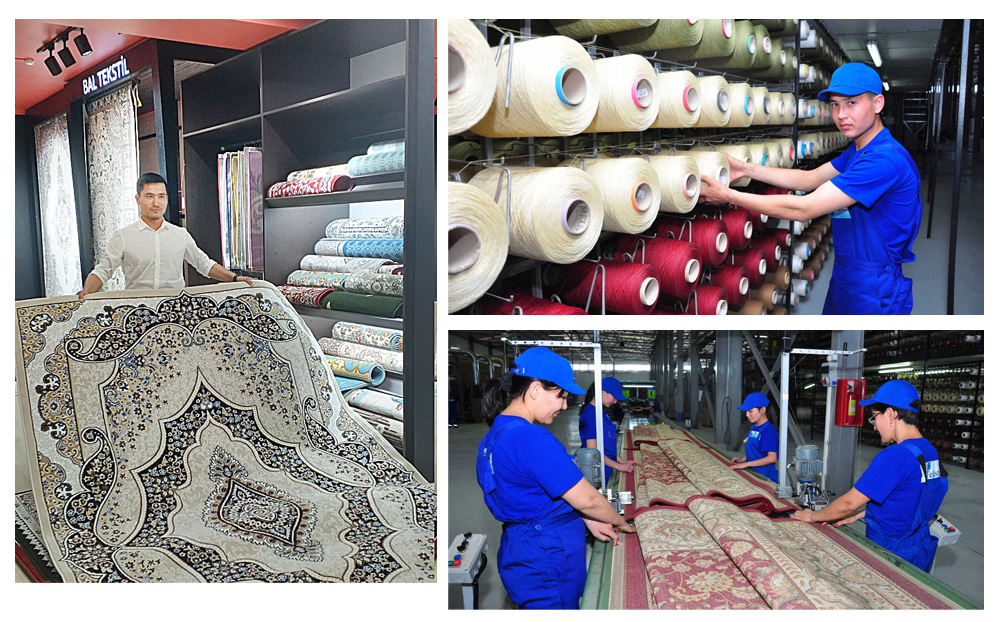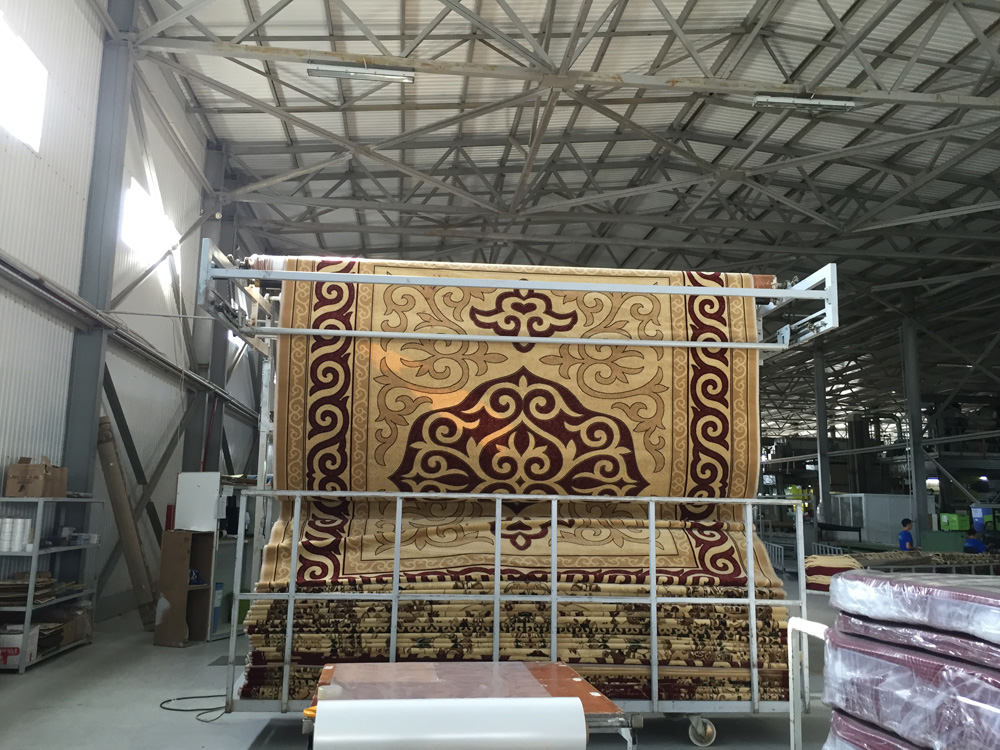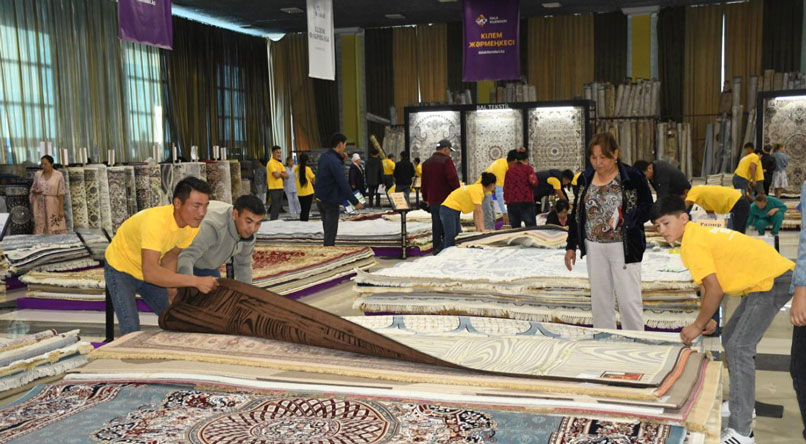ON THE CARPET
Native industrial enterprises are in a difficult situation due to the situation with the coronavirus.
But owing to the measures taken by the state to support business, they remain afloat and even make plans for the future.
In “Bal Textile” LLP, located on the territory of the “Ontustik” SEZ, during the state of emergency they had to send about 80 percent of employees on vacations without pay. Each of them received 42,500 tenge from the state. Only a workshop for the production of polypropylene yarns worked. The factory produced it not for sale, but in stock, for their own needs.
By the end of April, the enterprise began to gradually increase capacity and recall employees. Gradually, it switched to normal mode and returned almost all workers to their places.
According to the deputy director of the carpet factory Daulet Kanashaev, “any business is driven by demand.” During the state of emergency, non-food markets were closed, and branded stores didn’t work. Sales fell sharply. Demand is still low due to the fact that holding mass family celebrations in the country is prohibited. But carpets are bought mainly as a dowry for the bride, for housewarming and others. But the management of the enterprise is confident that these are temporary difficulties and life will improve. Most importantly, we managed to avoid staff cuts, and wages were kept at the same level.
“Bal Textile” LLP was registered in the “Ontustik” SEZ at the end of 2011, and in October 2013 we produced the first batch of carpets and rugs,” says Daulet Kanashaev. – This is a joint project of Kazakhstani entrepreneurs and the Turkish company “Kartal Tekstil Sanayi Ve Ticaret LTD. STI”, one of the largest carpet exporters in the world. Owing to government support, namely, preferences in terms of taxes and customs duties on imported raw materials, our company managed to launch production in a short time and establish partnerships with many foreign countries. If in the early years we had four carpet looms, today there are 13 of them! Due to our own production of synthetic threads, we got rid of dependence on raw materials, expanded the range, and reduced the cost of production by 20 percent. This material is cheaper than wool and polyamide, is resistant to dirt, after cleaning, the color does not lose its original appearance. At the moment, the capacity of the enterprise is more than five million square meters of carpets and rugs, four thousand tons of polypropylene threads per year.
We export 20 percent of our products to Russia, Uzbekistan, Azerbaijan, Kyrgyzstan and European countries. Cooperation with “LuLu Group” allowed us to send a trial batch to the UAE this year. We are considering the possibility of entering the markets of China and the USA. We are currently buying polypropylene granules for the production of threads in Russia and Iran. We are looking forward to the opening of a new plant in Atyrau. Our company actively uses the business support tools offered by the government. We participated in the programs “Business Roadmap-2020”, “Ondiris”, “Economy of Simple Things”.

In 2014, the world-renowned company IKEA drew attention to carpets made in Kazakhstan. We are the first enterprise in Kazakhstan with which a well-known Swedish brand has entered into an open-ended contract. It should be noted that this company conducts a strict selection of partners for cooperation. The main criteria are high quality products, business transparency, environmental protection, favorable working conditions for personnel. “Bal Textile” LLP fully meets all these requirements.
Specialists for the carpet industry are not trained in our country. Therefore, in the early years, the partnership had to deal with personnel training itself. Employees were sent to study carpet business in Turkey. And today the company has formed a backbone of real professionals who train young specialists. Young people were drawn to the carpet industry. And it’s worth a lot!
According to Daulet Yessenbayuly words, the coronavirus pandemic has affected plans to expand production. The construction of a new workshop was to begin in the summer. The work had to be postponed.

D. Kanashaev is sure that carpets are not subject to fashion. From time immemorial, they are considered a sign of prosperity, taste of the owners, highlight of the house. A modern carpet is aesthetics, eye pleasure, an accent in the interior, the final touch to create your dream room.
“Bal Textile” LLP offers to buyers who decide to add colors to life, carpets for any color and taste: plain, multi-colored, smooth-haired, with high pile.
“A group of specialists headed by a foreign designer is working on the design of our carpets,” continues D. Kanashaev. – Today the lineup is close to two thousand. They use national ornaments and patterns in the postmodern style, high-tech, avant-garde, neoclassical and so on. The collections “Turan”, “Efsun”, “Elegant”, “Oskar”, “Kumsal” are especially popular. For several years we have been holding a carpet fair “Uly Dala Kilemderi” in Shymkent, Almaty and other regions.
“Bal Textile” pays great attention to social support of employees. The management of the factory also actively participates in charity events. Help was rendered to the residents of Arys, the Maktaaral residents who suffered from the flood. The funds were also transferred to the fund to fight coronavirus.

Daulet Yessenbayuly also shared problems. For several years, the management of “Bal Textile” LLP has raised the issue of import and export of carpet products at different levels. Carpets from Uzbekistan, Iran, Turkey, Belgium and other countries are imported to the Kazakh market without hindrance. For example, in recent years, the volume of imports of carpets from neighboring Uzbekistan has grown significantly: last year it reached one million 300 thousand square meters. This is 16 percent of the total import to our country. While Kazakhstan exported about 300 square meters to Uzbekistan in 2018, in the past – 20 thousand square meters.
The carpet business is actively developing in Uzbekistan. This is due to the fact that our neighbors fully protect their market and manufacturers. When importing carpets into this country, you must pay customs duties and excise taxes. The same situation is with other goods. As soon as the Uzbek side notices that there is an increase in imports from a certain country, it immediately raises the excise tax rates for this product. For example, by the end of 2019, the rate was 15%, and from January 1, after a slight increase in exports from our country, it was increased to 30%. And this at a time when Uzbek manufacturers freely enter our market, do not pay excise taxes and actively use the right to VAT refunds in their country. It is worth noting that for some goods the excise rate in this country reaches 50%.
The company’s management suggests considering the use of mirror measures in relation to carpets and other textile products imported from other countries. The conditions must be equal and the competition fair. Today, a large number of textile products are imported to Kazakhstan from third countries that are not members of the EAEU.
Government agencies should carefully analyze goods for the presence of native analogues and promptly apply restrictive measures to enter the market of our country. If it is possible to provide on our own, why not to support local producers?
These measures would make it possible to revitalize the development of light and textile industries. The presence of a stable market will be additional foreign investment, given that it is extremely important for investors to have their own market and demand for a particular product.

